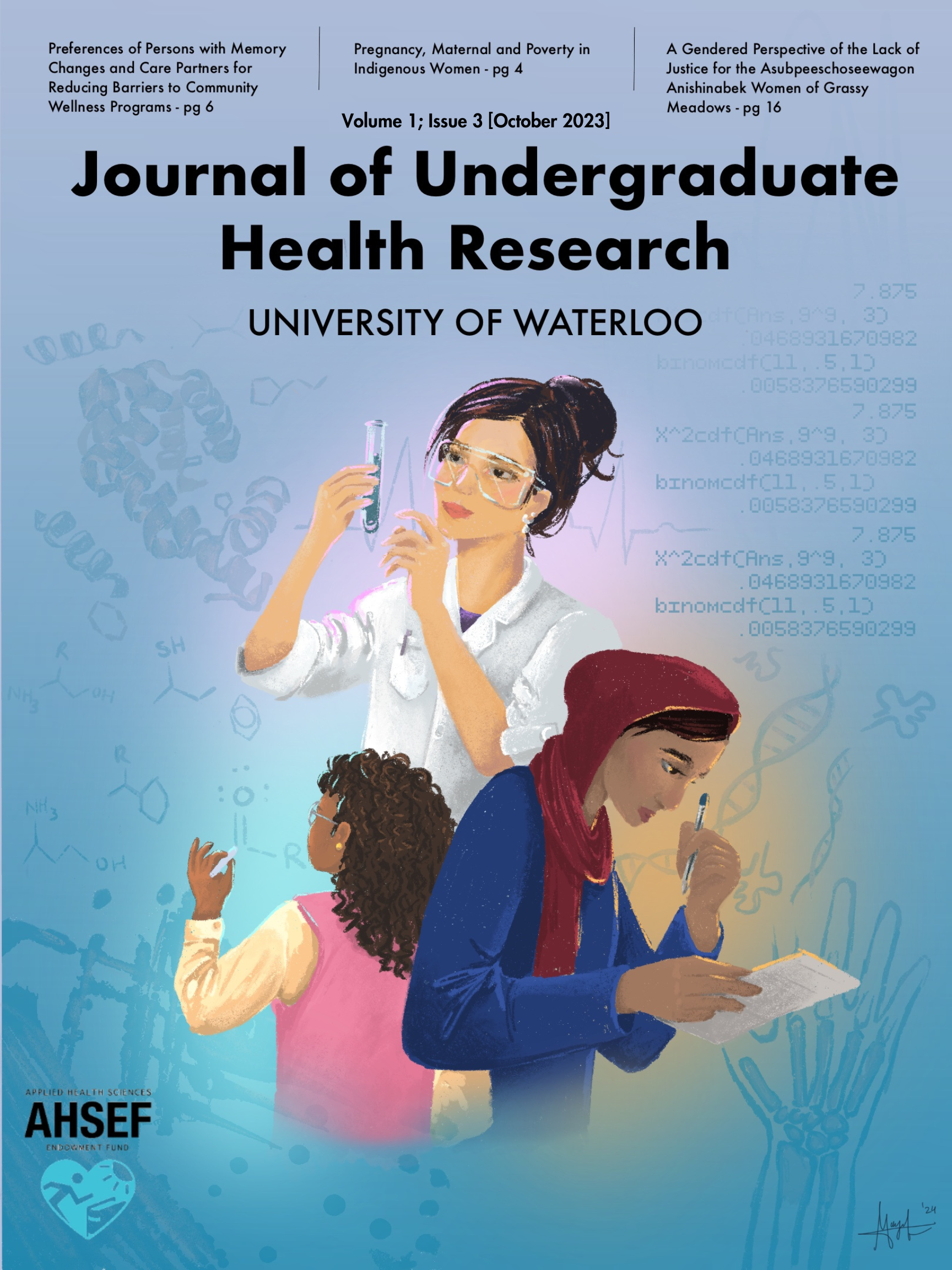Vol. 1 No. 3 (2024): University of Waterloo Journal of Undergraduate Health Research (JUHR)

After a brief absence, we are pleased to bring you the third issue of the University of Waterloo (UW) Journal of Undergraduate Health Research (JUHR).
In these past few terms, we faced several challenges, one of which being a large turnover of our original student body as results of folks graduating. For this reason, we tirelessly worked to re-hire creative and literary talent to reestablish the foundation necessary for the release of our much anticipated third issue. With a majority of positions being filled with new talent, we are excited to share with you this the ideas, output and journal content.
Throughout this process, our executive team has learned to appreciate several lessons, first being Murphy’s Law. In every phase of bringing you this issue, there were no shortage of challenges which momentarily impaired the progression of this journal’s activity.
However, it was equally true that resilience and collaboration remained the only effective antidote each of the challenges we encountered. We are proud of how well our team was able to communicate and navigate through challenges while maintaining a sharp conviction to press on and deliver. We hope that our experience with adversity can resonate with you as you navigate challenges, planned and/or unforeseen, during your academic journey.
Our newest issue showcase manuscripts which have critically examined pressing community-based health issues using a sociological lens. Alexandra Pepetone’s infographic for instance, highlights the unique challenge of food insecurity among UWaterloo undergraduates.
Sabrina D. Lutchmeah’s manuscript titled “Review of DSM-5 Diagnostic Criteria for Anorexia Nervosa and Recommendations to Improve Inclusivity” went beyond reviewing the diagnostic criteria for Anorexia Nervosa (a lethal eating disorder) and discussed the current limitations and modifications which may enhance the inclusivity during the diagnostic process.
Building on community-based health issues, Wei et al.’s manuscript titled “Preferences of persons with memory changes and care partners for reducing barriers to community wellness programs” examined the preferences of individuals with memory changes and their care-partners to evaluate the needs and preferences in accessing community wellness programs that tendered to nutrition and exercise.
In a first for JUHR, we feature two submissions that bring attention to the health-issues experienced by Indigenous Women, a sub-group known to disproportionately experience a variety of health inequities in the Canadian context. Amanda Armstrong’s opinion piece “A Gendered Perspective of the Lack of Justice for the Asubpeeschoseewagoon Anishinabek Women of Grassy Narrows” offers a critical examination and associated recommendations to the Ontario provincial government in the management of the health-issues experienced by the Asubpeeschoseewagoon Anishinabek women in relation to the mass mercury pollution encountered in the mid-1900s. Abeer Yusuf and Alysha Butt creatively summarize key findings of “Pregnancy, Maternal Health & Poverty in Indigenous Women”. Lastly, to reflect the timely development and use of Artificial Intelligence tools in health research and academics, Elen Mullaj’s manuscript “The Artificial Intelligence Dilemma: Navigating Ethics in Healthcare” highlights the implications of AI use in healthcare.
When consolidating these manuscripts, we hope that this issue emphasizes the importance, continuing need and future directions to pressing issues in community-based health issues. We sincerely hope that the content shared within this issue can leave an impression in your academic journey as future healthcare professionals.
We would like to express our heartfelt thanks to the creative team (led by Angela Koehn), editorial team (led by Ainsely Durnin & Jaspreet Gill), and administrative team (led by Rajnandini Ganguli). Also, to the Faculty of Health senior advisor (Dr. Diane Williams) and the Applied Health Science Endowment Fund and to everyone else who has contributed to and encouraged the growth of our journal.
Warm Regards & Happy Reading,
Francis Fernandes & Brandon Lu
Co-Editors of Chief
